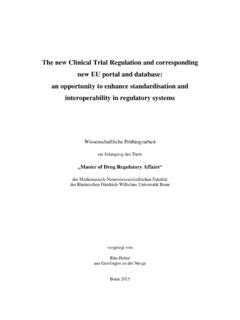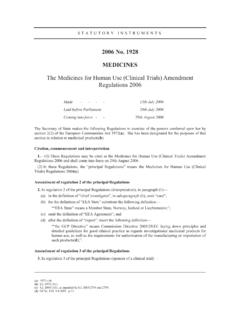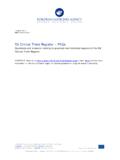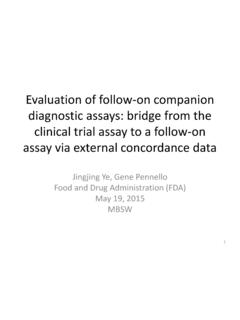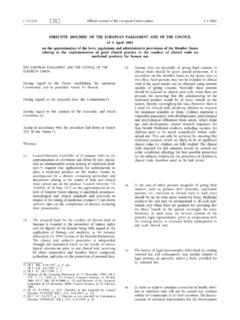Transcription of CLINICAL CONSIDERATIONS FOR EVALUATION OF …
1 Page 1 of 8 CLINICAL CONSIDERATIONS FOR EVALUATION OF VA C C I N E S FOR PREQUALIFICATION1 Points to consider for manufacturers of human vaccines October 2010 vaccine , Quality and Regulation (VQR), Quality, Safety, and Standards (QSS) Immunization, Vaccines, and Biologicals (IVB) World Health Organization (WHO), Geneva, Switzerland 1 These are derived from a WHO Workshop on PREQUALIFICATION PROCEDURES FOR VACCINES held in Chiang Mai, Thailand, 15 19 February 2010 Page 2 of 8 1. INTRODUCTION The United Nations Children's Fund (UNICEF) and other United Nations (UN) agencies take into consideration advice provided by the World Health Organization (WHO), through its Department of Immunization, Vaccines and Biologicals (IVB), on the acceptability, in principle, of vaccines considered for purchase by such agencies; this is known as vaccine prequalification.
2 The procedure to assess such acceptability is described in the document WHO/ (Procedure for assessing the acceptability, in principle, of vaccines for purchase by United Nations agencies). The procedure includes, for each product, the EVALUATION of the product summary file (PSF), initial testing of vaccine samples, and a WHO site audit. Part of the PSF EVALUATION is the EVALUATION of the CLINICAL experience with the candidate vaccine , which is usually done by external reviewers contracted by WHO. These evaluators, whose names are agreed upon by the manufacturer of the candidate vaccine , make recommendations based on the available CLINICAL evidence of efficacy, immunogenicity and safety for the product.
3 These recommendations are taken into account by WHO in the decision-making process for prequalification of each individual product. The CLINICAL EVALUATION of vaccines for prequalification differs, in part, from that conducted by national regulatory authorities (NRAs), as WHO will have a broader view of any vaccine than any individual NRA, whose mandate is restricted to its own jurisdiction. Among other things WHO evaluates whether there is evidence to support the use of candidate vaccines according to the Expanded Programme of Immunization schedules, and takes into consideration morbidity and mortality of the disease to be prevented in different target populations where the vaccine is likely to be used if prequalified, the influence of local serotype or strain distribution on vaccine efficacy, and possible interference due to concomitant administration of other vaccines.
4 In their reviews WHO evaluators focus on information that is not part of the NRA approval process, although in practice they also do at least a verification of what is expected to have been evaluated by the NRA. Manufacturers have followed the guidance of document Procedure for assessing the acceptability, in principle, of vaccines for purchase by United Nations agencies (now revised as WHO/ ), which refers to other complementary WHO guidance documents. However WHO Secretariat and evaluators have noted that interpretation of parts of those documents vary from one applicant to the other, and particularly new applicants have many doubts on the CLINICAL requirements for prequalifying a vaccine .
5 The submission of insufficient supporting CLINICAL data has delayed, and sometimes prevented, the prequalification of products that are needed worldwide for the prophylaxis of vaccine -preventable diseases. Clarification of the requirements for the prequalification of vaccines additional to what is provided by existing WHO guidance documents was deemed necessary. This document intends to provide additional guidance to manufacturers who submit applications for prequalification of vaccines. It includes some items that are included in. in the document WHO/ (Procedure for assessing the acceptability, in principle, of vaccines for purchase by United Nations agencies).
6 It shall be read in Page 3 of 8 conjunction with that document, and with TRS 924 (Annex 1: WHO guidelines on CLINICAL EVALUATION of vaccines: regulatory expectations) and other relevant WHO documents. 2. SUBMISSION AND REVIEW PROCESS Format and content of an application The format of the application should follow the recommendations of the document . WHO/ Applications in the PSF format are required and it is acceptable that the International Conference on Harmonisation of Technical Requirements for Registration of Pharmaceuticals for Human Use (ICH) Common Technical Document (CTD) format (if available) be submitted.
7 The PSF sections may be limited to detailed cross references to the relevant CTD sections simplifying the preparation and review of the application. The whole CTD instead of only the modules that are relevant to the CLINICAL EVALUATION should be presented, since there are often internal cross-references in that document. The PSF should now include in its chapter on CLINICAL experience (currently Chapter 8) the following additional requirements as stated in the document WHO/ : a) a tabulated summary of the CLINICAL development programme; b) a completed CLINICAL trial model summary protocol (according to TRS No. 924, p.
8 95) for pivotal (often phase III) trials; c) details of entry into a CLINICAL trial registry d) a pharmacovigilance plan. More details are presented below. Screening of applications The PSF of a vaccine submitted for prequalification is expected to have complete information to support the efficacy, immunogenicity and safety of that product, and evidence that such information is applicable to populations where the vaccine is likely to be used if prequalified. The summary of the CLINICAL development programme and the pharmacovigilance plan will be evaluated by WHO Secretariat at the screening stage, to ensure that the application is complete.
9 Queries may be sent to the applicant at this stage, and the acceptance of the application for review will be conditional to satisfactory answers. NOTE: In the case of traditional well established vaccines, a justification should be provided whenever the non- CLINICAL information and/or CLINICAL development programme do not comply with the requirements. Requirement for additional non- CLINICAL Information The PSF requires the presentation of a summary table of non- CLINICAL studies (WHO/ ) that will have been assessed during CLINICAL trial and license applications. Additional information on non- CLINICAL studies can be requested by the CLINICAL reviewers whenever necessary ( in the case of novel adjuvants), and if this is anticipated by the applicant such information may be included in the application.
10 Page 4 of 8 CLINICAL development programme The applicant should provide in the PSF a tabulated summary of the CLINICAL development programme, in one or more tables, in which critical parameters that may have changed during the CLINICAL development should be mentioned (see example in Annex 1). Requirement for the protocols of CLINICAL trials that support the prequalification application The applicant must provide the protocols of the CLINICAL trials supporting the application in English and in the original language, if different. The protocols should be the final approved versions, incorporating all amendments.










